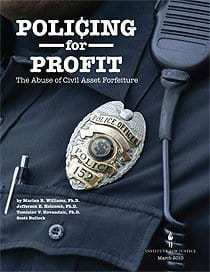By Curtis Bunn, Urban News Service
Darren wants his surname kept secret. After enduring civil-asset forfeiture, he fears reprisals from law enforcement.
“And you know why? Because this thing has let me know for a fact there’s no limit to what the police will do,” he said. “And they have the law behind them.”
The 43-year-old black man from Chicago said he had two large flat-screen televisions and an Apple computer seized by police last summer, after they mistakenly identified him as a drug dealer.
“They had the wrong house, the wrong guy, which I had been telling them all along,” Darren said.
He was cleared of wrongdoing and generated no criminal record. But police never returned his property.
Darren’s plight explains the growing nation-wide demand for reforms to the process of forfeiting civil assets.
Law-enforcement officials began the practice to fight criminal enterprises by curbing their resources. But reformers say it has become a financial boon for police departments that profit from the forfeitures.
Although police admitted their mistake and exonerated Darren of drug charges, the mound of money and paperwork required to recover his belongings was so steep that he eventually gave up.
“They said I had to have a ‘burden of proof’ that they were my items,” he said. “They came into my house and took them. That’s not enough proof? Then I would have to make a claim and then hire a lawyer. By the time I was told how much it would cost for the lawyer, which was about $5,000 … it just wasn’t worth it.”
So, Darren let it go. “It makes me sick to think about it,” he said.
“It’s the most corrupt and corrupting system in America,” said Clark Neily, an Austin, Texas-based lawyer with the Institute for Justice. “People have their belongings stolen from them. I use the word ‘stolen’ because that’s what it is.”
Case after case finds law-enforcement officials taking people’s belongings and never returning them. Police have grabbed homes, cars, electronics and cash under laws adopted in the 1980s as crack cocaine ravaged America.
“It wasn’t completely crazy to have seizures,” said Vikrant Reddy, senior fellow at the Charles Koch Institute, which hosted a panel discussion on the issue in Austin. “But it has swung too far. And with ‘equitable sharing,’ the state and federal government share the [seized] property … It’s become an incentive machine.”
Under the Justice Department’s Equitable Sharing Program, local governments and police share up to 80 per cent of the value of the property seized.
Government agencies grabbed more than $5 billion in assets in 2014 alone, according to The Washington Post. Of that amount, 81 percent, or roughly $4.2 billion, involved cash and property from people who never were indicted.
“The Constitution is supposed to protect your property,” said State Rep. Phil Stephenson (R – Wharton, Texas). “Quite simply, they are not following the law.”
Racial profiling has been at the heart of the problem. Last year, an ACLU study indicated 63 percent of cash seizures belonged to black people — and 32 per cent of the cash-seizure targets had never been convicted of a crime.
“People in the black community feel relentlessly harassed,” Reddy said. “People are losing faith in law enforcement.”
New Mexico Gov. Susana Martinez last year signed House Bill 560, the strongest legislation in America, allowing civil-asset seizures only from those found guilty of a crime — not just accused of one.
Reform advocates want more states to follow New Mexico’s lead.
Under forfeiture guidelines, police are only allowed to use the assets for training, overtime pay, building improvements, patrol vehicles and similar items.
But the Washington Post discovered they have also been used to finance exotic trips, a Zamboni ice-resurfacing machine and even Sparkles the Clown, whom police hired for an event in Reminderville, Ohio.
Proponents of asset forfeiture are almost entirely law-enforcement officials, who say these resources help them fight crime more forcefully.
But reform advocates seem to have gained the upper hand in the debate.
“I’m optimistic [about change] because the progressives think of it as a criminal-justice issue and the conservatives think of it as a property issue,” Reddy said. “You have situations where people don’t spend a minute in jail but have a difficult time getting their stuff back … The bottom line is that you have to be guilty before you take people’s property. Simple as that.”

